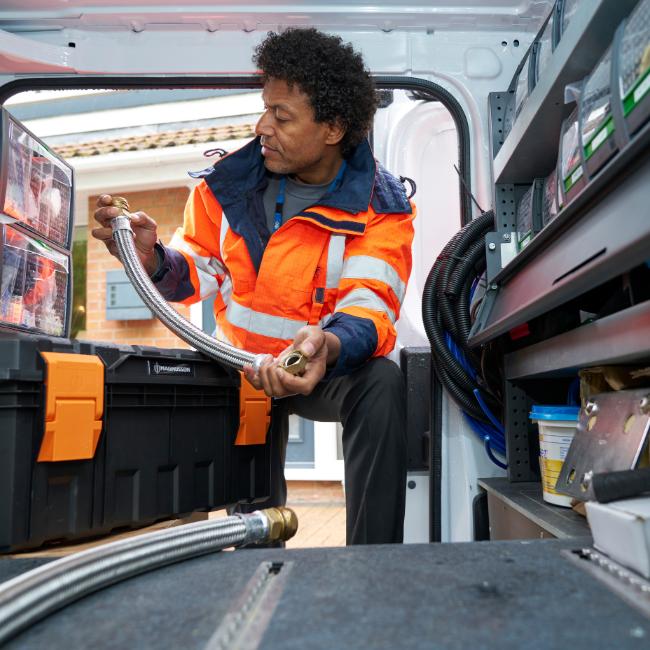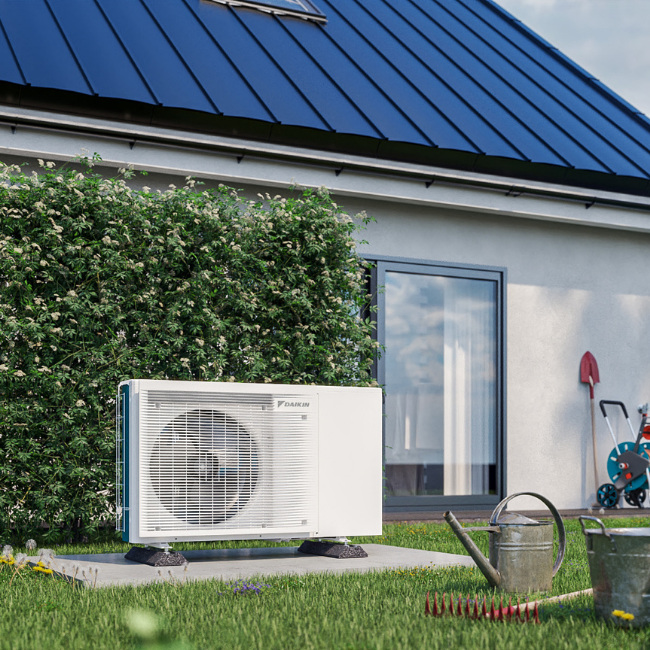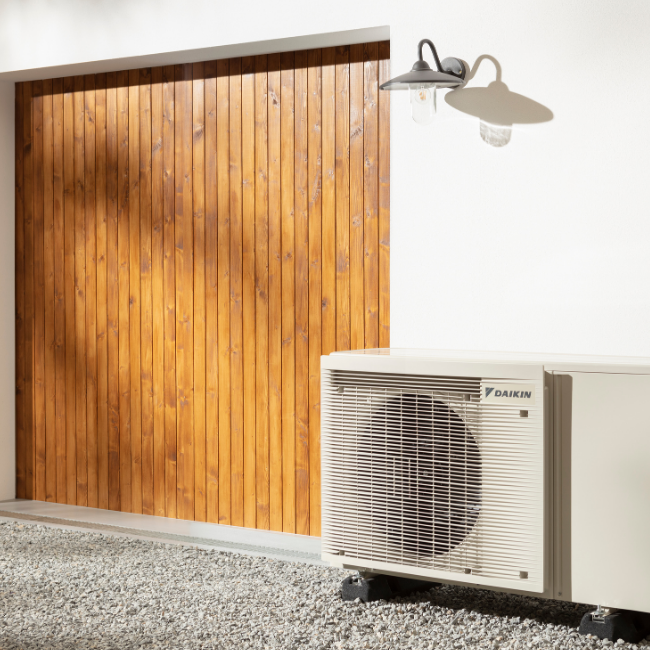Trusted heat pump installers
Explore the world of air source heat pumps from a Which? Trusted Trader, rated ‘Excellent’ on Trustpilot. Prices start from £4,850(1)
☑ £7,500 Boiler Upgrade Scheme.(2)
☑ ZERO standing charges for 12 months.(3)
☑ 300% more efficient than traditional boilers.
☑ Reduce your carbon emissions.
*This above price reflects the £7,500 government boiler upgrade scheme and is based on our lowest priced heat pump, cylinder and controls, with up to 8 radiators upgraded. Your individual quote will be specific to you and your requirements may rise depending on the system required to suit your home.
Speak to an expert – Get a free quote
How does installing an air source heat pump benefit you and the planet?
Heating accounts for over half of home energy use – something to consider when searching for an efficient way to reduce heating costs! One of the most economical ways to reduce costs is opting for a heat pump.
A heat pump transfers (or pumps) heat from one place to another. They work by absorbing energy from the air outside and converting it to heat your home even in temperatures below freezing. In fact an air source heat pump can still be effective down to temperatures of -28°C which is more than suitable for the UK climate.
Why is a Heat Pump greener and cheaper?
Heat pumps are much more energy-efficient compared to conventional heating methods as they can generate three to five kilowatts of heat for each unit of energy they consume. Since the heat pump doesn’t burn fossil fuel when producing heat, it generates far fewer greenhouse gas emissions than conventional heating. Additionally, heat pumps eliminate a potential source of carbon monoxide within your home.
According to the Energy Saving Trust, if you are replacing an old, G rated gas boiler with an air source heat pump system, you could save up to £590 per year based on an average 3 bed house in the UK. (A guide to air source heat pumps – Energy Saving Trust).


Spread the cost with monthly payments
(Subject to status and affordability)
A finance package means you could spread the cost of your air source heat pump installation with manageable monthly payments. Below is an illustrative representative example of what your typical repayments could look like over 5 or 10 years.
If you live in Scotland, you can apply for an interest-free loan of up to £7,500 through Home Energy Scotland.
Finance available at a fixed 0% or 9.9% APR representative, subject to status and credit check. The amount to be financed will vary depending on the heat pump required for your property and your chosen deposit.
Representative example
10-year finance plan monthly paymentsCash price: £12,644
Government grant (BUS): £7,500
Balance: £5,144
Deposit (15%): £771.60
Credit amount: £4,372.40
Interest: £2,411.82
Total amount payable (inc. deposit): £7,555.82
Number of repayments: 120
APR: 9.9%
Monthly payment amount: £56.54
Representative example
5-year finance plan monthly paymentsCash price: £12,644
Government grant (BUS): £7,500
Balance: £5,144
Deposit (15%): £771.60
Credit amount: £4,372.40
Interest: £1,134.20
Total amount payable (inc. deposit): £6,278.20
Number of repayments: 60
APR: 9.9%
Monthly payment amount: £91.78
Representative example
2-year finance plan monthly paymentsCash price: £12,644
Government grant (BUS): £7,500
Balance: £5,144
Deposit (15%): £771.60
Credit amount: £4,372.40
Interest: £0.00
Total amount payable (inc. deposit): £5,143.92
Number of repayments: 24
APR: 0%
Monthly payment amount: £182.18
Important information
Finance is subject to eligibility, status, and affordability checks. UK residents aged 18 or over only.
Deposit required: minimum 15%, maximum 25%.
Prices shown include the Boiler Upgrade Scheme (BUS) grant, subject to eligibility and approval by Ofgem. We do not receive any commission or incentive for introducing you to our finance provider. You are free to choose your own finance option.
Failure to keep up with repayments may effect your credit rating.
CB Heating Ltd trading as EDF Heat Pumps is a company registered in England and Wales, Company number 09885603, Registered office, Nova North, 11 Bressenden Place, London, SW1E 5BY.
CB Heating Ltd trading as EDF Heat Pumps is also an Appointed Representative of Shermin Finance Limited, Company number 01276121, Registered office, HomeServe, Cable Drive, Walsall, England, WS2 7BN.
Authorised and regulated by the Financial Conduct Authority, FRN 727594. Shermin Finance Limited acts as a credit broker and is not a lender - they can introduce you to a panel of finance providers and do not charge fees for their Consumer Credit services.
Why make the switch to an air source heat pump?
Environmental Impact: An air source heat pump is a fantastic renewable energy source with efficiencies that make it the perfect companion in your home if you want to reduce your carbon footprint. Moving away from fossil fuel burning heat sources like wood burners and gas boilers help you transition to Net Zero
Efficient Energy Use: Air source heat pumps can increase your energy efficiency to 300% and reduce your carbon emissions by 80% (2).
Year Round Comfort: An Air Source Heat Pump will keep you and your family warm all year round even in the coldest winter conditions here in the UK. You and your family will have enough home heat and hot water to keep you warm and toasty all year round.
Save Money On Your Energy Bills: Research from The Energy Savings Trust shows that you could save up to £240(1) a year on your energy bills. You could make further savings by switching to a specific Heat Pump Tariff such as one offered by our partners at EDF.


Heat pumps and the UK climate
The efficiency of a heat pump is often connected to climate factors such as temperature and humidity. Equipment manufactured and tested in conditions much different from those in the UK will not perform as well. The design and performance of a heat pump must be optimised by UK climate conditions. All of our solutions are fully tested for the UK climate. If you’re switching from an oil boiler to a high performance air source heat pump, significant savings could be made.
Will I need to replace my radiators?
Not in all instances, no. However, in some cases, we will recommend installing larger radiators and/or radiators with double or triple panels if you currently have single panel radiators. Larger radiators with convectors are generally the best radiators for air source heat pumps, while designer radiators, towel rails, and cast-iron models should be avoided due to their inefficiency with heat pump systems. Careful evaluation and measurement of your existing radiators will ensure that your heating system operates at its best, providing comfort and energy efficiency. These upgrades will improve the efficiency of your heat pump further, reducing running costs.
Before deciding on the type of heat pump, there are several key questions to be considered…
Heat pumps the UK climate
The efficiency of a heat pump is often connected to climate factors such as temperature and humidity. Equipment manufactured and tested in conditions much different from those in the UK will not perform as well. The design and performance of a heat pump must be optimised by UK climate conditions. All of our solutions are fully tested for the UK climate. If you’re switching from an oil boiler to a high performance air source heat pump, significant savings could be made.
Will I need to replace my radiators?
Not in all instances, no. However, in some cases, we will recommend installing larger radiators and/or radiators with double or triple panels if you currently have single panel radiators. Larger radiators with convectors are generally the best radiators for air source heat pumps, while designer radiators, towel rails, and cast-iron models should be avoided due to their inefficiency with heat pump systems. Careful evaluation and measurement of your existing radiators will ensure that your heating system operates at its best, providing comfort and energy efficiency. These upgrades will improve the efficiency of your heat pump further, reducing running costs.
Before deciding on the type of heat pump, there are several key questions to be considered…

Key questions to be considered
Is your home appropriately insulated?
For your heat pump heating system to be effective, it is essential that your home is well insulated. This ensures that your heat pump will provide you with the best performance and efficiencies.
What is the fuel that you are planning to replace?
According to the Energy Saving Trust, the savings are now greater for a gas system replacement than oil. Air Source Heat Pumps work best when replacing gas, oil or LPG as they run off a wet heating system. More savings can be made if replacing electric or coal but the pipework and radiators may need replacing.
What is your desired heating system?
Air Source Heat Pumps perform best with correctly sized radiators and underfloor heating, but our consultants will advise you on this during your call. They are not right for every property and we pride ourselves with providing honest and correct information.
Ready to upgrade your home heating system?
Our expert consultants are here to guide you through every step of the process. Talk to us today for your free consultation and quote and see why thousands of homeowners have trusted us to deliver their energy-efficient heating solutions.
Living with an air source heat pump
If you’re curious about making your next project more sustainable, hear from one customer who has made the transition.
Stephanie explains why she chose an air source heat pump and why she’s absolutely loving it!
NOTES
Indicative pricing
1. The price above reflects the £7,500 government boiler upgrade scheme and is based on our lowest priced heat pump, cylinder and controls. The figure quoted does not reflect any radiator upgrades that may be required. Your individual quote will be specific to you and your requirements may rise depending on the system required to suit your home.
Boiler upgrade scheme
2. Eligibility checks apply. Visit the UK Government website for details: https://www.gov.uk/apply-boiler-upgrade-scheme
Zero standing charges
A typical customer can save £164 per year versus the current single-rate price cap tariff. This is based on the following;
3. £164 of savings are based on a customer using Ofgem’s typical domestic consumption of 2700 kWh electricity and with heating provided by an air source heat pump with a coefficient of performance (CoP) of 3.1 providing equivalent heat to that from a 94% gas boiler using 11,500 kWh of gas.
Save £260 per year
4. The Energy Saving Trust: Figures are based on fuel prices as of July 2025. Find out more about how we made these calculations. The running cost you can expect will depend on the size of your home, any heating system upgrade and any saving will also depend on the fuel type being replaced. You can expect the saving to range between old and new, depending on the age of your current heating system. https://energysavingtrust.org.uk/advice/air-source-heat-pumps/
Efficiencies
5. Heat Pump investment roadmap, UK Government https://www.gov.uk/government/publications/heat-pump-net-zero-investment-roadmap/heat-pump-investment-roadmap-leading-the-way-to-net-zero
The Heat Pump Promise
6. With our Heat Pump Promise if your heat pump doesn’t perform as promised, we’ll give you a refund. Terms & Conditions apply https://www.cbheating.co.uk/wp-content/uploads/2025/05/H3373-AW1-V3.pdf


